Image; A striking shift in public policy has flown largely under the radar.
By Stephanie Simon | Originally Published at Politico.
March 24, 2014 05:01 AM EDT
Taxpayers in 14 states will bankroll nearly $1 billion this year in tuition for private schools, including hundreds of religious schools that teach Earth is less than 10,000 years old, Adam and Eve strolled the garden with dinosaurs, and much of modern biology, geology and cosmology is a web of lies.
Now a major push to expand these voucher programs is under way from Alaska to New York, a development that seems certain to sharply increase the investment.
Public debate about science education tends to center on bills like one in Missouri, which would allow public school parents to pull their kids from science class whenever the topic of evolution comes up. But the more striking shift in public policy has flown largely under the radar, as a well-funded political campaign has pushed to open the spigot for tax dollars to flow to private schools. Among them are Bible-based schools that train students to reject and rebut the cornerstones of modern science.
(Also on POLITICO: Science lessons from the Bible)
And this approach isn’t confined to high school biology class; it is typically threaded through all grades and all subjects.
One set of books popular in Christian schools calls evolution “a wicked and vain philosophy.” Another derides “modern math theorists” who fail to view mathematics as absolute laws ordained by God. The publisher notes that its textbooks shun “modern” breakthroughs — even those, like set theory, developed back in the 19th century. Math teachers often set aside time each week — even in geometry and algebra — to explore numbers in the Bible. Students learn vocabulary with sentences like, “Many scientists today are Creationists.”
Some 26 states are now considering enacting new voucher programs or expanding existing ones, according to the National Conference of State Legislatures. One concept that is gaining popularity, on the table in eight states: setting up individual bank accounts stocked with state funds that parents can spend not just on tuition but also on tutors or textbooks, both secular and religious. On Friday, the Arizona Supreme Court ruled the approach constitutional; lawmakers there are already working to broaden eligibility.
Voucher advocates talk of soon reaching a tipping point, at least in a few key states, when so many students will receive private education on the public dime that everyone demands the option.
Already, about 250,000 students take advantage of vouchers and tax-credit scholarships. That’s just a fraction of the 55 million public school students in the U.S., but it’s up about 30 percent from 2010. Some states have built growth into their laws. In Florida, for instance, public subsidies are set to rise from $286 million this year to about $700 million in 2018 even without further legislative action, as long as demand remains high.
The shifting of public funds to religious schools, especially at a time when scientists are making great strides in understanding the origins of the universe, alarms advocates of strong science education.
“I don’t think the function of public education is to prepare students for the turn of the 19th century,” said Eric Meikle, project director at the National Center for Science Education.
Critics also contend that the growth of voucher programs undermines the bipartisan drive to set uniformly high academic standards across the U.S. through the Common Core, which covers math and language arts, and the Next Generation Science Standards, which set out clear expectations for teaching about evolution and the origins of life. Voucher schools are free to ignore those standards and set their own curriculum, generally with little state oversight.
Participating parents, however, say it’s only right that the state should help them pay for an education that reflects their values. In many cases, that means the book of Genesis rather than “The Origin of Species.” Gallup polls consistently show that nearly half of American adults believe God created humans in their present form within the last 10,000 years.
Leah Fernandez, a Georgia mother of two, said she wants her children exposed to all views but used state subsidies to send them to a Christian school because she views a biblical education as essential. When she thinks about her priorities for schools, she said, “My children’s spiritual development is for sure No. 1 on the list.”
A BIG-MONEY PUSH
Voucher supporters have skillfully built strong networks of allies in many states.
They’ve spent heavily to campaign for sympathetic lawmakers, both Democrats and Republicans — often targeting primary races to knock out anti-voucher candidates early. They’ve staged rallies packed with cheering families. They’ve funded local advocacy groups such as North Carolina Citizens for Educational Freedom and Hoosiers for Economic Growth. And they’ve worked closely with black ministers to boost demand for vouchers in African-American neighborhoods.
The American Federation for Children, a major pro-voucher group, has spent $18 million on campaigns since 2007, spokesman Matt Frendewey said.
The Koch-funded group Americans for Prosperity is also a major player. In the last year alone, it has worked to promote subsidies for private schools in 10 states, including Maine, Tennessee, Virginia and Wisconsin, said Peggy Venable, the group’s senior state policy adviser. She said the group is motivated by a conviction that vouchers will encourage both private and public schools to compete and improve. “School choice provides accountability simply by providing parents with the power of choice,” she said.
With the groundwork laid, the fight is moving to statehouses.
A Florida bill that would have accelerated the rapid growth of vouchers in the state — where three-quarters of participating private schools are religious — hit a major roadblock last week as Republicans squabbled over accountability provisions. That bill appears to be dead, but existing law still allows subsidies to grow by 25 percent a year indefinitely.
In New York, meanwhile, Cardinal Timothy Dolan is personally lobbying for the state to spend up to $150 million a year on private school subsidies — a policy he hopes would keep some struggling Catholic schools afloat. The initiative has already passed the state Senate and has about 100 co-sponsors in the Assembly.
States aren’t the only source of action: Republicans in Congress are pushing for federal voucher programs, too.
Sen. Lamar Alexander (R-Tenn.) has proposed consolidating dozens of federal education programs into one $24 billion funding stream that states could use for vouchers for low-income students. House Majority Leader Eric Cantor (R-Va.) has made several high-profile speeches to promote school choice, including vouchers. And Republicans in both houses have vowed to restore funding for a D.C. voucher program that President Barack Obama cut out of his most recent budget.
Alexander, for his part, dismissed the risk that students might end up in faith-based schools that belittle mainstream science.
“I would think most parents would use vouchers to choose better schools for their child,” Alexander said through a spokesperson. “There is no evidence that student achievement in Catholic schools, for example, is lower than that of public schools. In fact, the reverse is often true.”
Catholic school students do score significantly higher than public school students on national standardized tests in math and reading. But they are also far more likely than public school students to come from well-educated families, and they are far less likely to be poor, have disabilities or still be learning English, federal data show. A 2006 study by the U.S. Education Department found that controlling for those variables effectively wiped out the private school advantage.
In any case, surveys indicate that parents don’t put too much stock in test scores when looking for private schools.
The Friedman Foundation, which supports vouchers, last year asked hundreds of families receiving tax-credit scholarships in Georgia why they chose a private school. “Religious education” tied with “better education” as the single most important motivation, far above the other choices.
A second Friedman Foundation survey of 1,400 voucher recipients in Indiana yielded similar results. Parents overwhelmingly cited “better academics” as their top reason, closely followed by “morals instruction” and “religious instruction.” Other motivations, such as a safer environment or smaller class sizes, fell way down the list.
The market reflects that demand: In state after state, faith-based schools consistently account for at least 70 percent, and sometimes far more, of the private schools receiving public subsidies.
AP BIOLOGY AS A TRAINING GROUND FOR ‘FAITH IN JESUS’
Not all religious schools, of course, teach creationism. Many have top-notch science programs with multiple Advanced Placement options. Many Catholic schools, in particular, make sure students get a solid grounding in evolution in biology class, no matter what they’re learning in theology.
Still, some of the most popular voucher schools in cities like New Orleans are firmly creationist.
Nationwide, science education activist Zack Kopplin has identified more than 300 creationist schools that receive public subsidies. That’s almost certainly a significant undercount, as his database does not include Pennsylvania, which has a huge program, or Iowa, which has a substantial one. Kopplin also counted only schools that advertised their philosophy online; many church-based schools don’t have websites at all.
Voucher proponents often describe the programs as a chance for students to escape failing public schools and obtain a better education. Yet the review of school websites and curricula found that some voucher schools openly declare that academics come second to their chief mission: training students to obey and glorify the Lord.
The schools also make clear that their goal is to arm students against modern prisms for looking at the world, such as multiculturalism, and to train them to assess every historical event or scientific advance through Scripture.
The definition of special-needs students is also elastic; in some states, children can qualify if they have food allergies.
Calvary Christian Academy in Philadelphia acknowledges on its website that “respected men and women of science, history, mathematics and language” have made great discoveries, but it reassures parents that “our understanding is not complete until we filter it through God’s Word.” Armed with Scripture, the site continues, “we should be able to disprove the fake and vain philosophies of the world.”
Another Calvary Christian Academy, this one in Fort Lauderdale, Fla., describes the goal of its AP Biology course as preparing “students to have faith in Jesus in an age of science by evaluating college-level biology, chemistry and physics from a purely biblical perspective.” Both participate in their states’ voucher programs.
And at Cherokee Christian School in Woodstock, Ga., the biology curriculum presents Charles Darwin’s theories mostly in the context of showing students how to rebut them. Students are taught to argue, for instance, that cellular mutation could not lead to increased genetic variation. A class goal: “Discuss the importance of a right view of evolution.”
That “faith-based, Christ-centered” approach is precisely why Caroline Horne chose to send her two daughters to Cherokee Christian using the state’s subsidized tuition program.
Horne, a veterinarian, said she knows what it’s like to take college science courses with people who dismiss the biblical creation story as fiction. That’s why she wants her children to get “a strong foundation in their beliefs” in high school, she said, “so when they meet people who don’t agree with them, they can defend their view.”
SUBSIDIZED BIBLE STUDY IN THE HOME
Each state sets up its subsidy program differently. Some offer parents vouchers to cover tuition payments. Others will grant individuals or corporations huge tax credits for donating to a nonprofit that then awards scholarships to eligible families. (Federal deductions are often available, too, so some donors can actually make money off their gifts.)
Most programs start out targeted at low-income or disabled children, but they often expand. In Indiana, a family of four with an income of $88,000 is eligible for a partial voucher. In Pennsylvania, families with income above $100,000 can qualify if their local public school posts poor test scores. An Arizona bill would raise the income cutoff by 15 percent a year indefinitely.
The definition of special-needs students is also elastic; in some states, children can qualify if they have food allergies.
Perhaps the most novel program on the books is Arizona’s Empowerment Scholarship Account. The state gives eligible families an average of $13,000 a year in public funds to spend on their children’s education. They can use the money not just to pay private school tuition but also to hire personal tutors or buy home school curricula, including creationist material.
The state superintendent, John Huppenthal, recently recorded calls to thousands of parents calling the program “great news” because it lets families finance “alternative education” on the public dime.
Both houses of the legislature in Mississippi have already approved a similar program that would give parents of special-needs students $6,000 in state funds. A conference committee is reconciling the bills. Voucher advocates estimate about 10 percent of students in the state would be eligible for the program, though participation would initially be capped at 500 children.
Seven other states, including Illinois, Iowa and Missouri, are also considering the concept, up from just two states last year, according to Josh Cunningham, an analyst with the National Conference of State Legislatures.
Meikle, from the National Center for Science Education, said he’s uncomfortable with parents picking and choosing a potentially narrow curriculum for their children. “Anything that prevents students from getting good exposure to the broad general consensus on a scientific subject is problematic,” he said.
But Doug Tuthill, who runs one of the largest private school choice programs in the nation, says states have no right to determine what kids should learn, beyond basic math, reading and writing. Other topics, from the age of Earth to the reasons for the Civil War, are just too controversial for a government mandate, he said, even when taxpayer money is at stake.
“Once a child has strong literacy skills, they can educate themselves,” said Tuthill, who runs Florida’s Step Up for Students program. “We don’t have to rely on schools, necessarily.”
Louisiana Gov. Bobby Jindal, a Republican, has also made a forceful case that when it comes to education, parents — not government bureaucrats — should call the shots. Jindal has accused Obama of violating that principle by first seeking to block and now seeking to monitor a voucher program for Louisiana students with household income of up to $60,000 a year for a family of four.
“We believe in empowering parents and giving them the option to remove their children from failing schools and enroll them in schools of their choice,” Jindal said through a spokesperson. He did not address questions about science education but added: “This is not a conservative versus liberal issue — it’s the right thing to do and it’s working, and we need to do this across the country.”
‘MILQUETOAST’ DARWINISM?
The U.S. Supreme Court has upheld the legality of voucher programs, even when they subsidize religious education, as long as parents who accept the vouchers have a choice in where to use them.
Some state constitutions, however, are more restrictive. The American Civil Liberties Union is suing to block voucher programs in New Hampshire and Colorado on the grounds that they subsidize religion in clear violation of state law. Both cases are pending before their state supreme courts; oral arguments in New Hampshire are set for next month. Litigation is also under way in Alabama.
“Taxpayer dollars are ending up in the coffers of religious schools, and they use that money to discriminate and indoctrinate,” said Heather Weaver, an ACLU senior staff attorney.
Weaver notes that religious schools participating in voucher programs are typically permitted to restrict admission to students who sign a statement of faith. Some do not permit openly gay and lesbian students or the children of gay or lesbian parents to enroll.
Another point of contention: accountability.
Voucher supporters often argue that 11 of 12 “gold-standard” studies show that vouchers improve student outcomes. But the evidence is not nearly as strong as that implies. Those 12 studies overlap considerably; many show only small improvements in outcomes for select groups of voucher recipients in select years.
Several of the states with the biggest programs — among them, Florida, Arizona and Pennsylvania — don’t require participating private schools to give students the same standardized tests that public schools administer, so direct comparisons are difficult. Often, there’s no provision to cut off the flow of state money to schools that perform poorly.
That troubles Maggie Garrett, legislative director of Americans United for Separation of Church and State. “We have no idea what these schools are doing with our money,” she said.
Voucher advocates respond that schools are accountable to parents: If they aren’t good, families won’t enroll.
“I expect over the long run, the schools that teach science the appropriate way will be the ones that win” in a free-market system, said Paul Peterson, director of Harvard’s Program on Education Policy and Governance.
Advocates also argue that teaching creationism doesn’t necessarily diminish the quality of other science education. “It doesn’t impact the laws of gravity, it doesn’t impact physics, it doesn’t impact the periodic table,” said Frendewey, the spokesman for the American Federation for Children.
Frendewey points out, too, that plenty of secular schools in our $700 billion public school system do a dismal job at teaching science. American 15-year-olds came in 23rd on the most recent international science test — beat out by peers in Canada, New Zealand and Vietnam, among others.
And it’s not as though a secular education guarantees rigorous lessons on the origin of life. The last major survey of biology teachers in public high schools, taken back in 2007, found that 60 percent sought to avoid controversy by toning down their lessons on evolution.
That statistic alone persuades Neal McCluskey, an education analyst at the libertarian Cato Institute, that subsidizing private schools is smart public policy. If every family could choose a school that reflected its values, he said, no one would have to sit through “milquetoast” lessons aimed at the mushy middle.
“If you want very rigorous evolution instruction, you should be able to choose that,” McCluskey said. “But you have to let other people choose something else.”
© 2014 POLITICO LLC

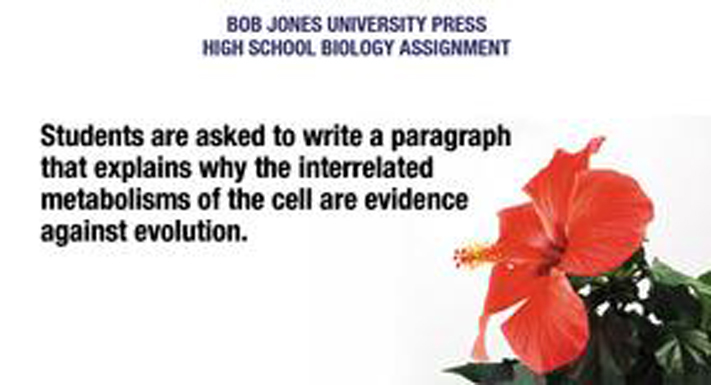
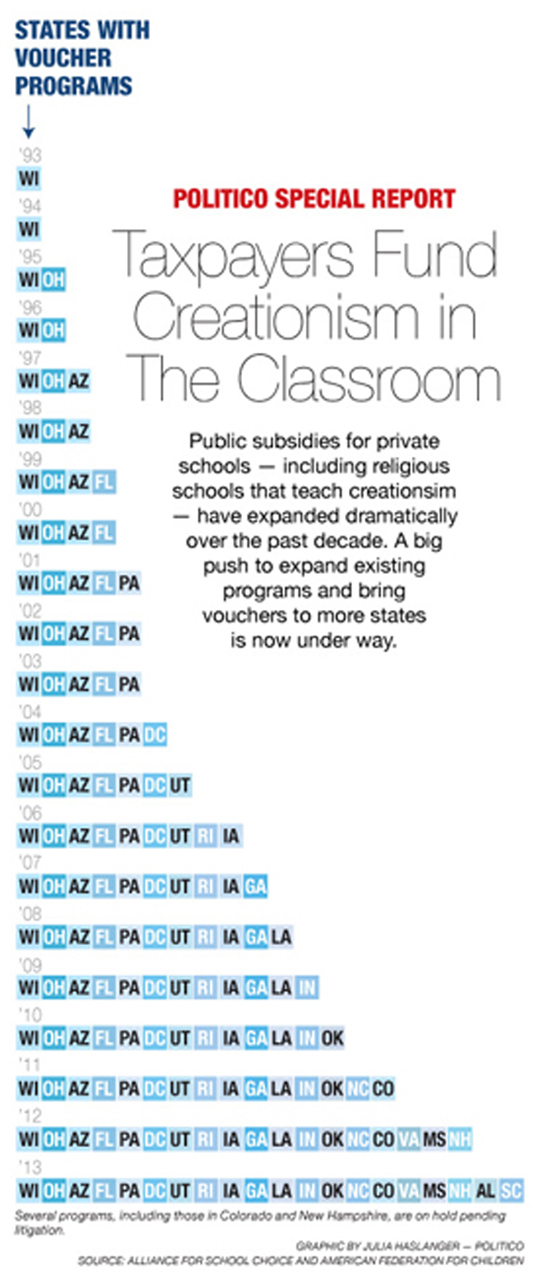
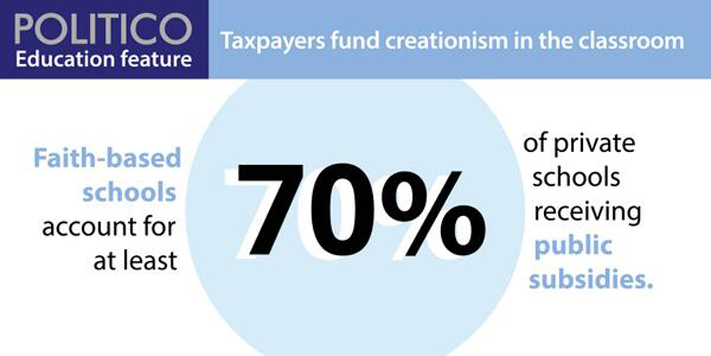





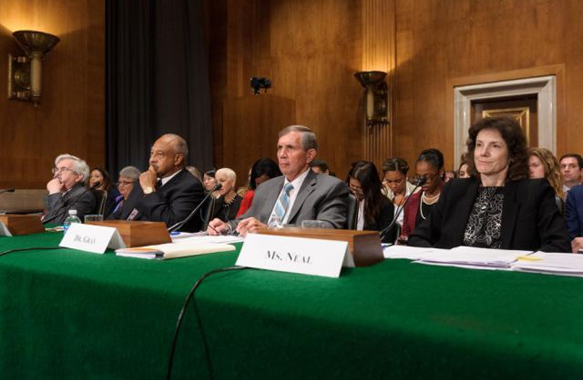

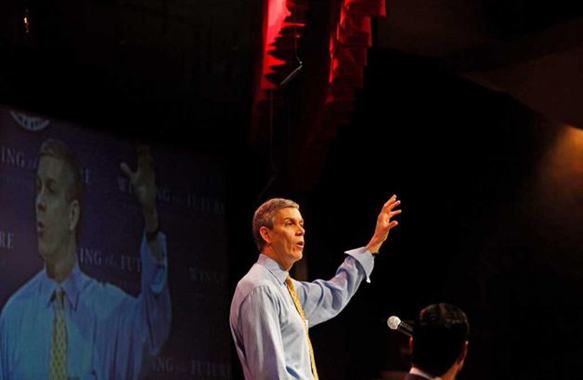
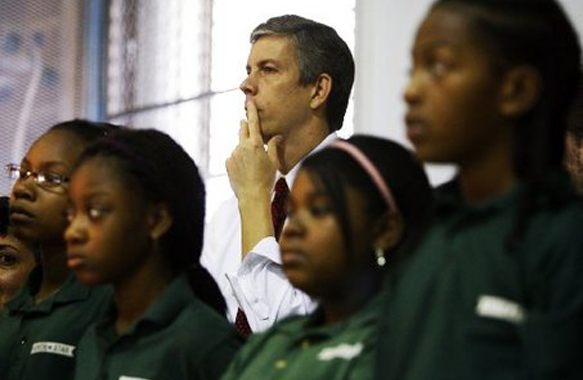

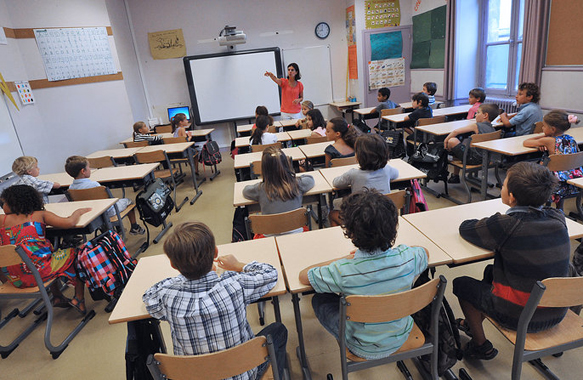
Leave A Comment